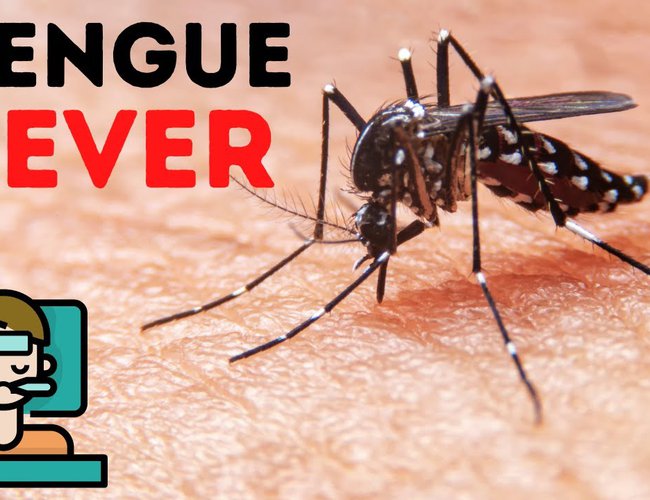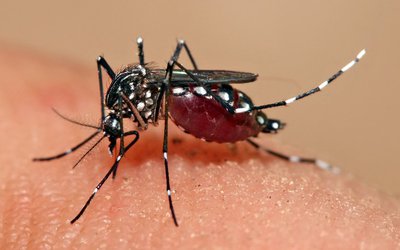
Dengue fever cases are rising sharply across Nepal, especially in the Kathmandu Valley, proving even more fearful than the COVID-19 threat as of late reports The Rising Nepal.
Health experts have warned that it become a serious public health issue and is adding burden to both healthcare system and individual patients and blamed the poor learning by the concerned authorities from the past epidemic, for the recent dengue outbreak.
Dengue, a mosquito-borne viral disease, transmitted by female mosquitoes mainly of the species Aedes aegypti, has been spreading at an alarming rate with severe symptoms including decline in platelets count. The hospital beds are occupied with dengue patients as more than 3,000 cases are being detected in a single day.
According to Dr. Gokarna Dahal, Chief of Vector Borne Disease Section at Epidemiology and Disease Control Division (EDCD), 22,988 dengue cases with 29 fatalities have been recorded across the nation.
Burden on public health
The dengue disease is associated with burden to healthcare system, productivity loss, personal cost to patients, and personal suffering. Dengue control interventions can be cost-effective in reducing dengue infection, said Dr. Shiva Raj Adhikari, a health economist.
Dengue will be costlier to the poor people, who never get tested and are compelled to buy the over-the-counter medicines in the nearest pharmacies. They often happen to spend more money for healing, be it on vitamins, or painkillers or any other medicines provided by the pharmacies, cautioned Dr. Adhikari.
“Most of the poor population and rural residents seek healthcare services in government primary healthcare facilities and private pharmacies. When the dengue test is not available at the government facilities, they seek help at the medicals. This leads to being misdiagnosed or left untested and left untreated.
As the government hospitals are overwhelmed by the dengue patients, many patients are compelled to get admitted at the private hospital, which adds financial burden on them, said Dr. Adhikari.
Lalitpur became the hotspot for dengue first. Prava Khanal, 57, of Lalitpur, had dengue fever, she suffered a lot. “Oh my god! I still feel the pain in my joints and back. It was so deadly.” Khanal who had also been infected with COVID-19 felt that dengue was more painful.
Khanal was aware of dengue, and she started to clean her household and throw all the stagnant water in and outside her house. However, she has not seen any authorities visiting her place to make people aware about mosquito control measures.
The concerned authorities must have exercise detecting and destroying mosquito-breeding sites, source reduction by ‘search and destroy’ before the monsoon, said Dr. Sher Bahadur Pun, chief of the Clinical Research Unit at Sukraraj Tropical and Infectious Disease Hospital. But no proper measures have been adopted when the virus is spiking at an alarming rate, he added.
Speaking at a public programme recently, Nepali Congress General Secretary Gagan Kumar Thapa had said that dengue disease is now spreading as no lesson has been learned from the COVID-19 pandemic.
Thapa, who is also a former Minister for Health Population, said that the lack of preparedness was the main reason behind the recent outbreak. The local representatives should make the public aware by means of door-to-door campaign, they must reach the field including schools, colleges and offices for search and destroy of the mosquito breeding sites, he added.
Ensure free testing
Bishnu Simkhada, 41, of Gongabu suffered from dengue fever along with three other members in his family. But only Simkhada went hospital for testing.
“As dengue test was so costly, other members of my family did not bother to test,” said Simkhada. “I went to a private hospital, and I was charged Rs. 2,200 for dengue testing,” he added.
Pankaj Yadav from Siraha, now residing in Budhanilkantha, said that he suffered from high fever with body ache, but he did not get tested. An electrician, he said that he could not go to work for more than 15 days due to weakness. “I thought it was viral fever.’
Dengue fever, also known as bone-breaking fever can be dangerous and cause complication if testing and treatment is not done in time. The chances of severe dengue rises if proper treatment is not received from physicians.
Hospitals are charging Rs. 500 to 2600 per person for dengue test. Bir Hospital and Sukraraj Tropical Hospital are charging Rs. 500 for the test while private hospitals are charging costs ranging from Rs. 1800 to Rs. 2,600.
Doctors warned that lack of testing facility and treatment options increases the risk of people developing severe dengue, which can be fatal. Even during COVID-19 pandemic, test charges weren’t regulated by the government and some private hospitals were charging more than Rs. 6,000 during the initial stage.
“During such an outbreak of epidemic, the government must ensure free testing and treatment for the public so that no productive lives will be lost,” said Dr. Adhikari.
Doctors suggested timely testing as dengue should be identified in time by its symptoms which include acute fever, pain in eyeballs, frontal headache, vomiting, joint pain, and skin rash.
However, some patients may develop life-threatening conditions such as acute dengue hemorrhagic fever, dengue shock syndrome, and multi-organ failure. The dengue patient needs to take medicines as prescribed by the doctors.
Risk of spread in villages
The dengue infection has been already reported from 76 out of 77 districts across the country. With Dashain barely a fortnight away, the usual festive mood excitement is seen among village returnees. However, health experts fear massive outbreak of dengue in villages as health facilities in rural setting lack human resources to deal with surging infection.
Once people start visiting their hometown for Dashain celebration from dengue hotspots, there is a risk of massive outbreak, warned Dr. Pun.
As a dengue control and prevention programme, our agency has already sensitised the local governments for taking control measures, said Dr. Dahal of EDCD.
The ECDC has ensured technical support along with testing kits for the local levels, informed Dr. Dahal.
- Nepal-UK Tech Forum Held
- Jul 06, 2025
- Hari Sayani or Devshayani Ekadashi 2025: Day Of Tulsi Plantation
- Jul 06, 2025
- Siddhababa Tunnel Makes A Major Milestone
- Jul 06, 2025
- Weather Forecast: Generally Cloudy Across The Country With Heavy Rain At One Or Two Places Gandaki, Bagmati and Koshi Provinces
- Jul 06, 2025
- India’s External Affairs Ministry’s Senior Officials Says Indo-Nepal relations are ever expanding
- Jul 05, 2025














